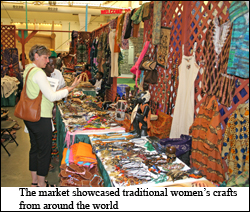World Urban Forum: Ideas for action
 Vancouver, Canada – By the close of the 3rd World Urban Forum last Friday in Vancouver, over 11,000 delegates had attended the event. The ideas and perspectives they gained while in Vancouver could go a long way in changing the future of their own cities and towns, which is exactly what organizers of the Forum had hoped for.
Vancouver, Canada – By the close of the 3rd World Urban Forum last Friday in Vancouver, over 11,000 delegates had attended the event. The ideas and perspectives they gained while in Vancouver could go a long way in changing the future of their own cities and towns, which is exactly what organizers of the Forum had hoped for. Attendance at the event was 40 percent more than expected, and in terms of numbers and mishap-free operations, the Forum clearly was an event management success.
Measuring the long-term impact of the discussions that took place is more difficult, however, because the actions that will arise from the ideas delegates acquired at the conference may take years to unfold.
Delegates attended from all levels of civil society, including non-governmental organizations, slum advocates, academics, students, the private sector and various governmental bodies. They shared a wide range of ideas on urban sustainability issues, including rights for the urban poor, environmental issues in cities, and the role of the private sector in creating liveable communities.
As Commissioner General Charles Kelly remarked, the complex challenges facing the world’s cities demand a variety of solutions, something which the Forum attempted to address by bringing many stakeholders together in one place. “What this is, is a multitude of people sharing how to deal with these very difficult problems,” he said. “It isn’t one action; it’s thousands upon thousands of actions.”
As noted in the official report of the Third Session of the World Urban Forum the success of the event “lay not just in what was discussed but in what was learned.”
Key principles which came out of the conference include:
- Embracing and preparing for urban growth is necessary, as the urban population in developing countries is expected to double within 30 years
- Engaging the urban poor and involving all stakeholders is necessary when addressing poverty
- Increased resources and financing are urgently required to provide slum upgrades and environmental infrastructure necessary for sustainable development
Several Forum attendees agreed that the real challenge for delegates now lies ahead, as they return to their own cities and take action based on the ideas they acquired in Vancouver.
“For such a forum, there is no closure because this is just a part of the action we are taking,” Pierre Sane, assistant director-general of UNESCO, said during closing remarks. “We leave with a commitment now to do our utmost best in our respective capacity to turn the principles contained in the convention into reality and turn ideas into action.”
A host of experts, international officials and grassroots activists delivered various messages of hope and urgency throughout the conference.

“The sustainable city is a possible dream, said world-renowned urban theorist Professor John Friedmann from the University of British Columbia. “It means embracing the fact that cities are embedded in their environment on which their future depends. It means engaging local citizens in the common effort by giving them a stake in the society of which they are a part. It means reaching out to other cities, other regions and strengthening emerging networks. Above all, it means trusting in your own powers to shape the future that lies ahead,” he added.
The importance of developing environmental infrastructure for the world’s existing urban poor and also for urban immigrants that are seeking new communities was well supported.
“In a world where one billion people live in slums in overcrowded condition without access to basic services, what would be a concrete way to make significant improvements in their lives other than access to water and sanitation?” said Anna Tibaijuka, Under Secretary-General of the United Nations and Executive Director of UN-HABITAT.
The methods outlined for achieving the needed investment in such environmental services were as varied as the conference participants, since each situation may require some combination of municipal governance, private sector engagement, international organizations, citizen action and national involvement.
A common theme however, was the need for all stakeholders to embrace urbanization as a positive trend that is neither possible of preferable to slow or stop.
“We think it is time, rather, to focus on the positive impacts of urbanization, and to introduce policies to make cities more inclusive and more efficient,” said Katherine Sierra Vice President and Network Head of Infrastructure for The World Bank.
As Forum participants - from slum dwellers to city leaders, to the heads of international organizations - return to their home cities, they will take with them a multitude of ideas, learning experiences and inspiring new relationships. The challenge that lies before them to turn the lessons learned into positive action to improve the economic, environmental and social conditions in their cities.
As noted by many, the task is enormous; but unchecked urbanization is one of the most important issues facing humanity this century. The effectiveness with which we address urban growth will define the economic, social and environmental future for many regions of the world.
The World Urban Forum has provided a spark through its theme of “Sustainable Cities: From Ideas to Action”. That message is now being discussed in countless forums around the globe, and inevitably it will help change the shape of tomorrow’s cities - one building, one decision, one action, and one idea at a time.
You can return to the main Market News page, or press the Back button on your browser.

